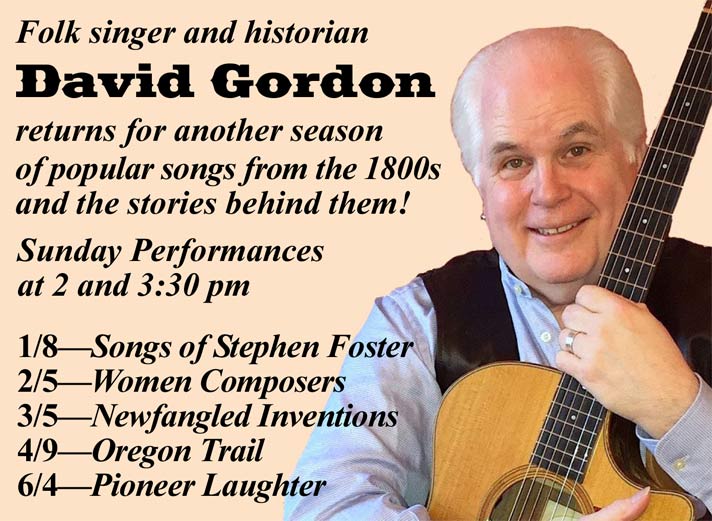David Gordon, the “Northwest Troubadour” 2017 Season of “Pioneer History in Story & Song”
JACKSONVILLE, OR—On Sunday, January 8, 2017, Northwest Troubadour David Gordon begins a second season of “Pioneer History in Story & Song,” bringing the experiences of our ancestors and the history of the region to life through 19th Century folk songs and the stories behind them. Kicking off the 5-concert series is “Stephen Foster, or Making Music American.” Foster was America’s first great composer and its first free-lance songwriter. For this program David will trace Foster’s evolution through such songs as Camptown Races; My Old Kentucky Home; O Susanna; and Beautiful Dreamer and include readings about Foster from abolitionist Frederick Douglass and others.
These one-hour performances sponsored by Historic Jacksonville, Inc. begin at 2pm and 3:30 in the Naversen Room of the Jacksonville Library located at 340 West C Street. Admission is $5, with proceeds dedicated to maintaining and preserving historic structures in Jacksonville, Oregon, and bringing their history to life through programs, activities, and events. Space is limited, so reservations are strongly encouraged!
Future concerts will spotlight “Music on the Oregon Trail” (February 5), “Songs about New Fangled Inventions” (March 5), “Women Poets and Ballad Composers” (April 9), and “Pioneer Laughter—19th Century Humor in Music and Words” (June 4).
David Gordon has been described by The Washington Post as “an irresistible performer,” weaving a soothing musical tapestry of songs, irresistible vocals, gentle guitar stylings, stories, musings, and his own unique brand of goofy humor. With this series, he combines his consummate charm, wit, and story telling skills with a return to his early musical roots.
A career that began with a love of banjo, guitar, folk music, bluegrass, and an early ambition to be a high school music teacher morphed into an international career as singer and recording artist. A 40-year veteran of the operatic and concert stage, David has performed in every major opera house and concert hall in the U.S. and Europe. The Chicago Tribune has called David “one of the world’s great Bach tenors,” and for the past 28 years he has been an integral part of the Carmel Bach Festival as soloist, dramaturge, vocal coach, and staff member.
Behind the scenes, David has been an historian, author, lecturer, translator, and book publisher. But no matter what he does, the central thread of his work has been a combination of music, historical research, and storytelling. David describes his current mission as “bringing life to the songs and stories of the pioneers. Through music they speak to us and their stories come to life!”
David and wife Ginna—a noted artist, chef, author, bookbinder, and publisher in her own right—now reside in Jacksonville.
For concert or series reservations or additional information, contact info@historicjacksonville.org or 541-245-3650. For additional information about David Gordon and the 2017 season of “Pioneer History in Story and Song,” visit http://www.nwtroubadour.com.
January 8: Stephen Foster – Making Music American (1826–1864)
Foster was America’s first great composer, and its first free-lance songwriter. His 200 published songs sold millions of copies, yet he died poor and alone. David combines the story of Foster’s brief life with 8 or 9 of his songs, presented in chronological order, including Camptown Races; My Old Kentucky Home; O Susanna; Beautiful Dreamer; Come Where My Love Lies Dreaming; Hard Times Come Again No More. This program includes readings about Foster from abolitionist Frederick Douglass and others.
February 5: Music on the Oregon Trail (1841–1870)
Emigrants on the Oregon Trail could not bring much with them, but they could take along the songs they knew, and those songs gave them strength. In their diaries, the emigrants often mentioned specific music they heard and sang on the Trail, and this program is devoted to those very songs, including: Wait for the Wagon, The Blue Juniata, The Boatmen Dance, My Old Kentucky Home, O California, and more.
March 5: Songs about Newfangled Inventions (1850–1880s)
The mid-19th century saw the appearance of astounding technological marvels—amazing new devices like bicycles (velocipedes), hot air balloons, gas lights, electricity, sewing machines, the telegraph, and machines of all sorts. Of course, these inventions inspired songs such as Up in a Balloon, The Flying Velocipede, The Wondrous Telephone, Charlie the Telegraph Clerk, Song of the Sewing Machine, and more.
April 9: Women Poets and Ballad Composers (1840–1890)
In the 19th century Western World, women generally did not compose music, and in fact they were widely prevented from doing so. The few who did used male pseudonyms. However, in mid-19th century America, women wrote and published poetry and ballads. The lyrics and music of artistic pioneers such as Marion Dix Sullivan, Carolyn Mason, Susan Parkhurst, and Elizabeth Allen include some great hits of the early parlor song repertoire, like The Blue Juniata, Do they Miss Me At Home, My Lovely Canoe, All Quiet along the Potomac Tonight, and more.
June 4: Pioneer Laughter – 19th century humor in music and words
Laughter is timeless, even if styles of humor change, and people have always enjoyed a funny song. Absurdity, flirting, drinking, personal styles, and society in general were all lampooned in such 19th century songs as People Will Talk; I Wish I were A Girl; If You Only Have a Moustache (Stephen Foster); The Man on the Flying Trapeze; Champagne Charlie; and more. This program includes an 1872 satire of a Methodist sermon on “Old Mother Hubbard.”
